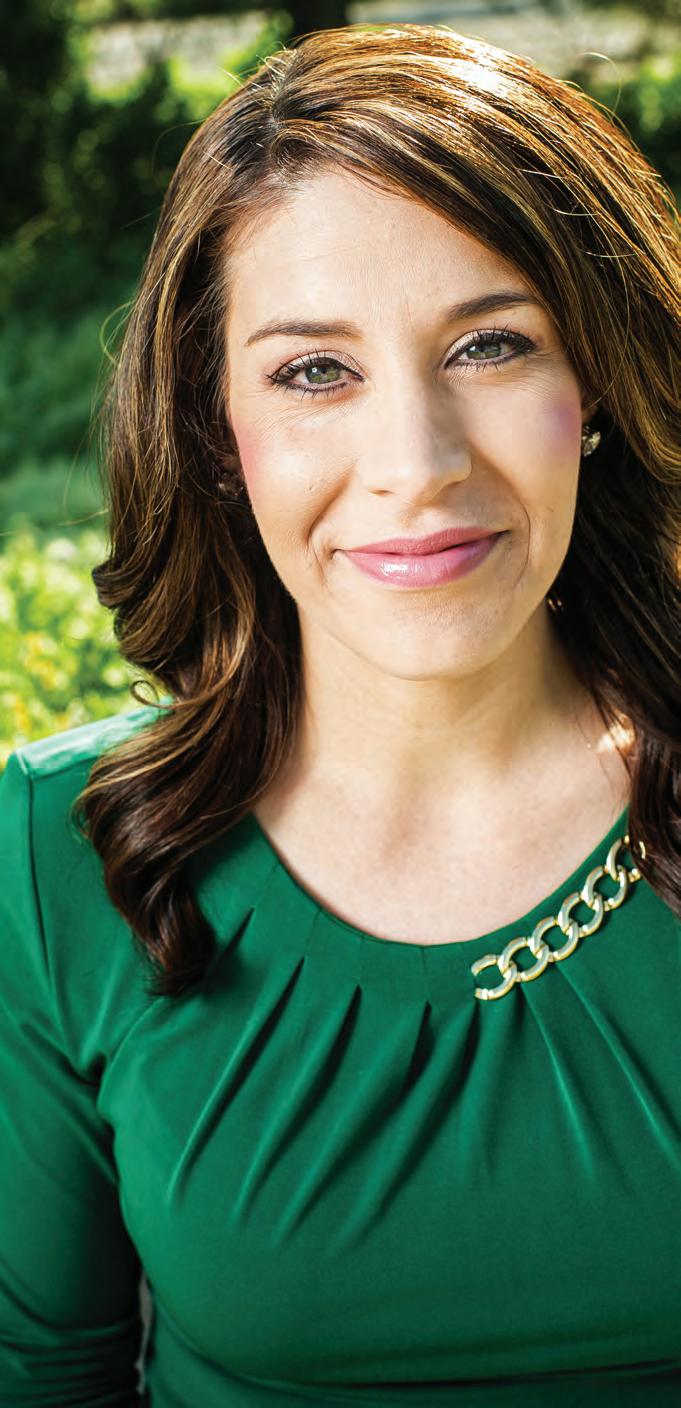
44 minute read
One of Us
ALPHA PHI'S ACHIEVING EXCELLENCE
Advertisement
ONE OF US
Amanda Venegas
Gamma AlphaSan Diego State
As a television news anchor for ABC30 in California, Amanda Venegas (Gamma Alpha-San Diego State) co-anchors the morning news live broadcast, and it is a natural fit for her.
“I HAVE ALWAYS LOVED TELLING STORIES TO my family and presenting information to my classmates. I was very involved in student leadership from a young age and that was nurtured in Alpha Phi,” said Amanda. “I spoke in front of our large chapter and was involved in Panhellenic and Associated Students at San Diego State University….I’ve always thought that each person can teach you something or has a story to tell.”
She has been sharing those stories through a role in media since she was interning at ABC stations early in her career. Those internships allowed her to build a resume tape and a highlight reel. Her experience and her involvement in online journalism landed her a job in television after graduation.
“My first television job was in Billings, Montana. I was green and willing to learn. I worked my way up from reporter to weekend anchor. Four years later, I was able to land my dream job working in my hometown of Fresno, CA at the ABC owned and operated station,” said Amanda.
She has been at ABC30 for eight years and served as a morning anchor for nearly
five years. Her sister in Alpha Phi, Margot Kim (Eta Kappa-UC Irvine), is the lead news anchor at ABC30, and has been a source of encouragement and inspiration. Along the way, she has covered triumphs and tragedies alike. She is proud to be a familiar face for her viewers each morning and to be able to report in the community in which she grew up.
Media first attracted Amanda as a career because of her curiosity and love of speaking in front of others. “My parents are both deaf and I have always helped interpret for them. I’ve seen them treated unfairly and think it’s important to shed a light on injustices,” said Amanda. “I also love highlighting positive things in our community. Being in the media means you get a front row seat to events in the community, whether it’s the president or a breaking news event.”
Amanda says that the most rewarding part of her job is the opportunity to report stories that help others. Along with her colleagues, she is part of history—finding new ways to adapt and share the news amidst the COVID-19 pandemic. With new safety measures, she has found herself stretching to present information in new ways. Like many members of the media, during this time, Amanda often reports from home, with her children and family nearby, and mostly off-camera.
“Right now, I wake up, turn on the lights in my office and log onto Skype to anchor a nearly three-hour show. My first thoughts are: How
can we get the facts to our viewers? What do they need to know?” said Amanda. “As a reporter, I am trying to focus on small businesses in our area. With a mask on, I interview people six feet away and take many precautions to keep myself and others safe.”
“Every day when my alarm goes off at 2:30 AM, I am excited to know that I get to share information that people need to know as they start their day. I hope to inform them and encourage them. I am inspired by people in our community and the team that I work with,” said Amanda. “I think journalism is evolving and I love being able to use social media to connect directly with people and the story.”
Finding time to connect with her Alpha Phi sisters is still special for Amanda. Every time she reunites with them, she is reminded that the bonds of Alpha Phi are unbreakable. Amanda and her husband Matt love spending time with their two children, big brother Jacob and daughter Cambria. Cambria is a brain surgery survivor, as she was born with rare health complications and a seizure disorder.
“I am so fortunate to be best friends with the very girls that I met at Alpha Phi years ago. We text and encourage each other through each step of our lives. When my daughter was in the hospital, I learned the depths of their friendships. They were there every step of the way, from visits to meals, even though they lived all over the state. This is sisterhood.”
In her free time, Amanda and her family spend time together outdoors, hiking at Yosemite National Park and enjoying moments with their dog, Pugsly.
Q&A
Why she joined Alpha Phi:
I never had a sister growing up, and always enjoyed the friendship of others. At Alpha Phi, I found a home and a place to grow – along with some amazing friends.
Best lesson she has learned:
Tough skin is a must in television. It is a competitive industry with a lot of deadlines and pressure….You have to balance learning from critiques and sometimes just brush them off. If you love it, pursue it and don’t give up. It’s your dream, not someone else’s. Don’t let anyone else write your story.
Her advice:
Intern as much as you can. The more you learn how to present and write, the more prepared you will be to work in television. Also, introduce yourself to each person at the station. They’ve already landed a spot there. You have nothing to lose and who knows, they could give you great advice and help you land your next job.
STANDING UP TO HARVARD
by Gina Henke
The world watched as Harvard shared news in 2016 that it would strip their single-gender organizations of equal rights and representation. As of the print deadline, Alpha Phi’s Iota Tau chapter was the only remaining women’s group on campus because of the college administration mandate that single-gender organizations and final clubs could no longer receive equal opportunities on campus. As of just June 29 — a victorious date for Alpha Phi and other Greek organizations — Alpha Phis and others will have the freedom to gather without fear. On that date, current President of Harvard Lawrence S. Bacow released an email statement to the Harvard community, rescinding the policies that prevented single gender social groups from receiving the same rights as others on campus.
A cause for celebration, the repeal of the ruling has been recent — although so many of us have long recognized the need for the discriminatory sanctions to be lifted. Our sisters and brothers in the Greek system have also dedicated their valued voices to this issue, and we have fought for years to allow members to gather in support of one another.
The message from Harvard is discussed in detail in the sidebar on page 22. There, you will also read what current Alpha Phi chapter President Hannah Printz (Iota Tau-Harvard) has to say about the importance of this turnabout.
This article was written before Harvard removed their policy, and we believe it is important to recognize the women who took a stand for what they believe in. In the world in which we live, we are reminded how critical it is to learn, grow, act and listen to support the rights of all of our members. The former Harvard policy left women without a true opportunity to engage in organizations that are important to them, for fear of repercussions.
Standing up for what you believe in is important. Our founders knew it. Our volunteers and staff know it. Our collegians know it. Our alumnae know it. Amelia, Michelle and the women of Iota Tau know it. It is time for us all to
— AMELIA APGAR (IOTA TAU-HARVARD)
be inspired to reflection, to action, to further education and to continuing conversations that challenge us to always do what is right.
The journey taken by the women of Iota Tau is one of courage, loyalty, determination and belief. While several men’s-only organizations were allowed to operate without the same fear of the sanctions — because they owned their own property and enjoyed the financial security that comes from having hundreds of years of alumni — two Alpha Phis led the fight for what they believe in — equality, sisterhood, empowerment, one another and our Fraternity.
Meet the women who led the fight to reestablish the Iota Tau chapter on Harvard’s campus.
BY GINA HENKE
FAUST
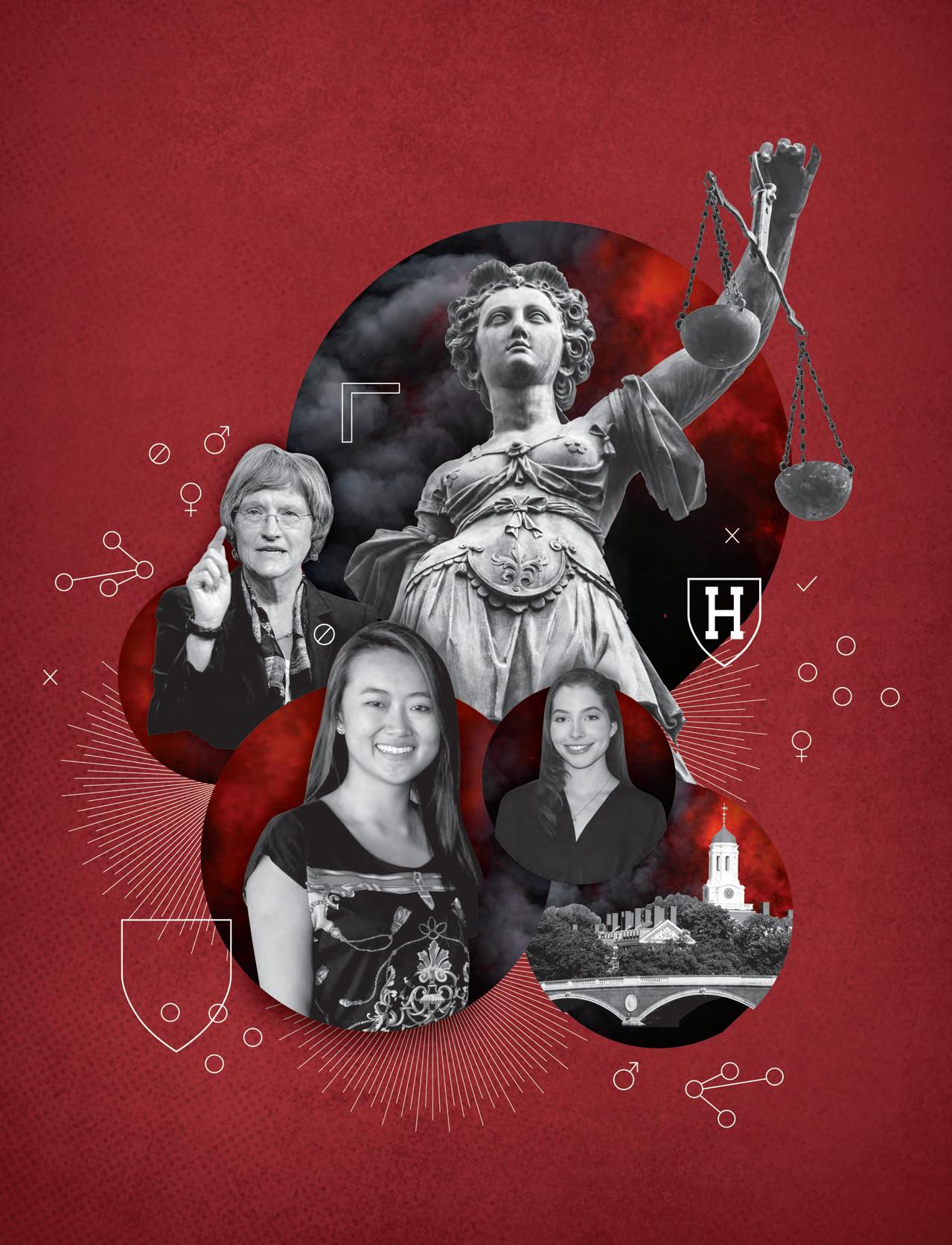
XIE
POHOTO CREDITS: DREW G. FAUST (PHOTO BY MICHAEL WUERTENBERG/ WORLD ECONOMIC FORUM); JUSTICE (QUERBEET/ISTOCK); HARVARD (JORGEANTONIO/ISTOCK) APGAR
When Amelia Apgar (Iota Tau-Harvard) and Michelle Xie (Iota Tau-Harvard) joined Alpha Phi, they were intrigued by the community aspect of the organization.
“As a first-generation college student, I struggled to become acclimated to collegiate life during my first semester. Joining such a close-knit community on campus was truly a turning point in my undergraduate career: I met so many new friends, like-minded women passionate about empowering one another and mentors,” reflected Amelia, now a graduating senior.
She never anticipated she would have the opportunity to attend college, let alone an institution like Harvard. It was through becoming an Alpha Phi that Amelia began to feel comfortable navigating the intense, new environment. “…I truly do not believe my college experience would have been possible, let alone memorable, without Alpha Phi,” said Amelia.
Michelle, an alumna since 2019, also struggled with belonging when she stepped onto Harvard’s campus. “Looking back, I think many students have ‘imposter syndrome’ for being a Harvard student,” recalled Michelle. “I joined Alpha Phi because I loved the idea of being able to turn to a diverse group of women on campus for any question I had. I also loved that Alpha Phi and Greek life, in general, is not confined to just one campus…I was joining an international sisterhood and network of strong women.”
Michelle and Amelia served as Iota Tau presidents at different stages in the fight for women’s groups’ rights at Harvard (Michelle first and then Amelia), and advocating for the preservation of those rights connected them on a who new level.
In 2016, Harvard’s then President, Drew G. Faust, decreed that “undergraduate members of unrecognized single-gender social organizations will be banned from holding athletic team captaincies and leadership positions in all recognized student groups. They [would] also be ineligible for College endorsement for top fellowships like the Rhodes and Marshall scholarships.” 1
— DREW G. FAUST,
AS PRESIDENT OF
HARVARD IN 2016


1 Fahs, C. Ramsey. “In Historic Move, Harvard to Penalize Final Clubs, Greek Organizations.” thecrimson.com, 6 May, 2016, www.thecrimson. com/article/2016/5/6/ college-sanctionsclubs-greeklife/.
The sanctions took place beginning with the Class of 2021, and they prohibit members from previously available opportunities on the grounds that singlegender organizations are exclusionary.
When the sanctions were first proposed, Michelle was a freshman, new to Alpha Phi and, like many sisters, not sure the impact the sanctions would have. As the consequences of the sanctions and their more concrete regulations became more apparent, Michelle was increasing her involvement in Alpha Phi. “My previous apathy started bubbling up to anger and frustration. I continued to have people outside of my chapter try to tell me what my chapter was doing and be unwilling to listen to my chapter’s growing concerns,” said Michelle. Retention and recruitment suffered.
There were many reactions amongst the active sisters. Several felt torn, unwilling to risk their leadership positions in other campus groups because of an affiliation with Alpha Phi. Some thought it best to sever the charter with Alpha Phi and try to operate as a mostly female organization to protect younger members from the negative consequences of the sanctions. Others felt their safety on campus would be threatened if the group admitted members into whatever “new” organization it became on campus. There were also women who felt that losing Alpha Phi’s international connection was too large a cost to our fundamental bonds. Despite appeals, Alpha Phi, like all other women’s-only social groups, dissolved on campus. Alpha Phi was the last group to make this decision. Amelia would often connect with women who had been in Alpha Phi with her. While the sisters of Iota
Tau fully recognize that gender marginalization exists, they did not agree the policies that were enacted created a more equal system; rather, the policies marginalized women on campus and excluded them from the conversation.
“When I returned to campus the fall of my junior year, there were no women’s social organizations at Harvard. None,” said Amelia. “Meanwhile, there were eight all-male organizations that continued to dominate life on our campus. I knew this was wrong, it was unequal and it was unsafe. I could not believe that this was happening to women in the 21st century.”
For Amelia and Michelle, it felt as though these actions and sanctions were moving the campus backwards. Over time, most all-female social organizations on campus (sororities and female final clubs) severed ties with their international organizations; yet, male final clubs continued to operate as they always had. “There has always been a power imbalance in Harvard social life between male and female groups,” said Michele. “Male final clubs host the exclusive parties and events on campus, and are notoriously hard to become members of. These clubs are hundreds of years old, own large houses in the heart of Harvard Square and have famously wealthy and successful members and alumni.”
In contrast, many women’s-only groups at Harvard had formed in just the last 20 years. “Alpha Phi on campus started in 2013, and our alumnae were few and barely out of college, unable to substantially assist [the chapter] financially. Men could now join more social organizations, as formerly all-female organizations became gender neutral; however, women were still barred from male final clubs,” said Michelle.
Ultimately, Michelle and Amelia felt the sanctions tipped the campus toward an uncomfortable, unsafe and unbalanced dynamic that permeated every aspect of life at Harvard. “I didn’t just feel undervalued, I was told so,” said Michelle. “When asked in an interview on Bloomberg about the unfair effect of sanctions on women’s groups, Drew Faust, Harvard’s former president – and


— MICHELLE XIE (IOTA TAU-HARVARD)
a woman herself – said that women’s groups were second to men’s on campus….What about giving women’s groups the support they need to have more value? Men have been on campus since 1636 and women were allowed to slowly trickle into the undergraduate student body in the 1970s. To assume we have equal footing is hugely inaccurate,” said Michelle.
Said Amelia, “Harvard has ignored the voices of women on its campus for centuries and they continue to do so today. Whether it be our opposition to the current sanctions, or our general fear of such a male-dominated space, Harvard has not listened. We had tried to work with the institution and communicate with the appropriate offices as constructively as we could; yet, to no avail. Harvard was not interested in the lived experiences of women on their campus and that was quite clear to us.”
The loss of shared community hit the women hard. After trying, and failing, to work with the college and become acclimated to a campus without women’s spaces, Amelia and Michelle began to rebuild Alpha Phi on campus in whatever capacity necessary. In November 2018, after speaking with several sisters about reforming, Amelia and Michelle wrote the letter asking the International Executive Board (IEB) of Alpha Phi to reinstate the Iota Tau charter.
As they worked with their chapter advisor Allie Winkelman (Gamma
Epsilon-Lake Forest), they engaged with previous members who were interested in rejoining as active collegians. Twelve women agreed to join them, with full understanding of the challenging road they were facing, and the IEB voted to reinstate the charter. This past January, the chapter held elections in which they elected their second full board since their reinstatement.
One silver lining to the pressure put on women’s organizations at Harvard, from Amelia’s perspective, has been the increased level of commitment to women’s rights and empowerment among members. “…These women are actively standing up to Harvard and joining a sanctioned organization because the three ideals of Alpha Phi remain so important to a woman’s education, even today,” said Amelia.
When it comes to standing up for what they believe in, these women — and all of the Iota Tau members — have demonstrated they have what it takes. “It is definitely hard to take a stance against authority, especially when they are unwilling to listen,” said Michelle. “But over time, I’ve realized that it’s not me against the sanctions; rather, it is a group of strong women that all believe in the same principles that I do. I feel so much more comfortable knowing that I’m not standing up for something alone, [while] being a voice for the group.”
Amelia recently graduated and plans to take the leadership skills and education she has earned to pursue a career in politics and government. Michele has used her own leadership experience and talents to build her career in software engineering. They have their eyes focused on the horizon, looking forward. The road they traveled was not easy or free from obstacles, but because of their experience in advocating for their own rights, they are bringing to every new venture a sense of pride, responsibility, power and purpose.
In the Alpha Phi Creed, we pledge our fidelity to and belief in one another and in our Fraternity: I believe in it as
a shrine of international sisterhood wherein I may find love and loyalty, sympathy and understanding, inspiration and opportunity.
“These words are the cornerstone of our organization and of our stand against Harvard. They continue to inspire us in all that we do, especially during the most difficult of times,” said Amelia. “It may take one person to stand up for what she believes to be right, but we could not have done this alone. Michelle and I were so grateful that so many fellow Alpha Phis agreed with how we were feeling and felt the same commitment to our women’s organization as we did. Without them, restarting the organization would not have been possible.”
“In many ways, Harvard sets the standard for other colleges around the world. To be able to stand up to the administration with the backing of the International Alpha Phi community felt like we were taking charge of a situation bigger and extending beyond Harvard’s campus. The support of Alpha Phi and the Greek community continues to amaze me. Women I meet for the first time, or have only virtually met, have shown me warmth and support. This is definitely an incredible community to be part of.”
View a video address from the Harvard Iota Tau chapter undergradautes at www.facebook.com/AlphaPhi/videos


Rights Upheld
Just prior to print deadline, we learned the news that the policies and sanctions enacted by Harvard during the time of past President Drew Faust have been rescinded. Citing the lawsuit brought by fraternities and sororities last August, current President of Harvard Lawrence S. Bacow noted, in an email statement released to the Harvard community on June 29, that the refusal of the United States District Court in Boston to dismiss the case influenced the college’s decision to remove the policy.
In his note, he said, “In essence, the court accepted the plaintiffs’ legal theory that the policy, although adopted to counteract discrimination based on sex, is itself an instance of discrimination based on sex. The court reasoned that the policy applies to men but not women who seek to join all-male social organizations and applies to women but not men who seek to join all-female social organizations, and that this constitutes sex discrimination under federal law.”
The message continued, sharing that since it seemed clear that Judge Gorton of the U.S. District Court, would decide in favor of the single-gender social groups who brought the case forward, Harvard would be legally barred from continuing to enforce the policy. That said, he encouraged student organizations to continue to adopt membership practices that permit all be admitted. The mindset has not changed, but we are thankful the justice system has prevailed. Hannah Printz Iota Tau chapter President, like others, learned about the decision to remove the sanctions through an email President Bacow. Before she finished reading the message, she received a text from a sister that read, “NO MORE SANCTIONS.” “I don’t think I’ve ever been so shocked and thrilled to read three words….I was overcome with joy to know that all of our efforts had finally come to fruition….Our whole chapter is elated to know that we’ll only grow from here and that we will be able to welcome future Alpha Phis without any fear of sanctions,” said Hannah.
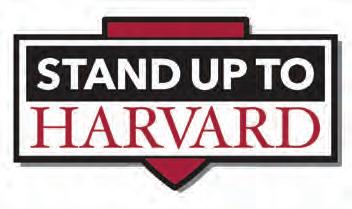
Since she first stepped onto Harvard’s campus as a freshman, the sanctions were in place. She shared that she and others have had to choose between hiding their membership in Alpha Phi or risk the consequences of publicly declaring herself as a member. “The removal of this fear factor overwhelms me with relief and hope for the future of our chapter and Harvard as a whole. Nobody should have to choose between being a part of a strong and supportive community, like Alpha Phi, or being in good standing with their University. I am so glad this is no longer a decision that women on Harvard’s campus will have to make.”
This experience has changed her as a leader and as a woman. “Being a member of Alpha Phi allowed me to stand up for something I believe in, empowering and inspiring me to take on further leadership in the group by assuming roles that have taught me invaluable lessons about leadership and responsibility.”
WHEN SUSAN PAGE DAILY (THETA Theta-St. Joseph’s) was initiated into Alpha Phi in 1998, she felt connected to the women in the chapter and knew she could be herself around them. Three years earlier, Marisa DiChiacchio (Theta Theta-St. Joseph’s) joined Alpha Phi and remembers the desire to build lasting friendships and mem ories together with her sisters. They bot h found what they were looking for in Alpha Phi, even if their paths did not connect often on campus.
Susan recalls thinking Marisa’s senior class was full of cool, wise women she looked up to, and, after graduation, both Marisa and Susan went on to enjoy life. They built careers and nurtured families. They enjoy reunions and con necting with college friends. They see e ac h other a few times a year. Their kids connect. Today, they take part in Zoom calls and make use of social media to stay in touch.

When Susan and Marisa made a home in Alpha Phi, they never imagined one of them would have a son whose health would one day bond them together more deeply than before. by Gina Henke
Susan, a stay-at-home mom with a background in special education, say s, “Currently, many of us are in different stages with our kids or living in different parts of the country, so it’s harder to physically get together…. I am not the biggest fan of social med ia, but at a time like this, I thank God for Facebook. Right now, our sister really needs us and it’s a fast avenue to be able to keep in touch and now keep in close contact as we support our sister, Marisa.”
When Marisa, now a senior recruiting consultant at a staffing firm, had her eldest son, Connor, in 2008, she never dreamed she would find herself having a conversation with his doctor nearly eleven years later that would change their lives forever. On April 24, 2019, she and Connor’s dad, Mike Dobbyn, learned that Connor had a rare, genetic, terminal disease called Sanfilippo Syndrome.
“My h eart broke into a million little pieces because I learned that my first born was literally given a death sen tence with no cure,” said Marisa.
Tha t moment was the terrifying culmination of years of questions. When Connor was just under one year old, he presented with a speech delay and qualified for Early Intervention guidance. At three and a half years-old, his fine motor skills did not seem to be advancing as quickly as expected and so Connor was evaluated by a develop mental pediatrician.
G en etic testing was also performed, but initially showed no red flags. At that time, Connor was given a diagnosis of attention deficit hyperactivity disorder (ADHD), developmental delays and motor planning disorder. When symp toms were not improving one year l at er, Marisa and Mike sought a second opinion. They believed Connor was on the autism spectrum, and enrolled him
in social skills, speech, occupational and physical therapies.
In k indergarten, Marisa says, Connor’s teacher agreed that he definitely p r esented signs of being on the autism spectrum, so they took that information to his developmental pediatrician who finally gave an autism diagnosis. Then, in third grade, Connor’s school per formed a full psychological evaluation. Hi s IQ had plummeted 40 points and there was a cause for concern. It was recommended that Connor undergo another genetic test, and the results of that test pointed to Sanfilippo Syndrome.
“I magine Alzheimer’s, but in children. In a nutshell, that’s what every family of children with Sanfilippo Syndrome
SUSAN PAGE DAILY (THETA THETA-ST. JOSEPH’S)
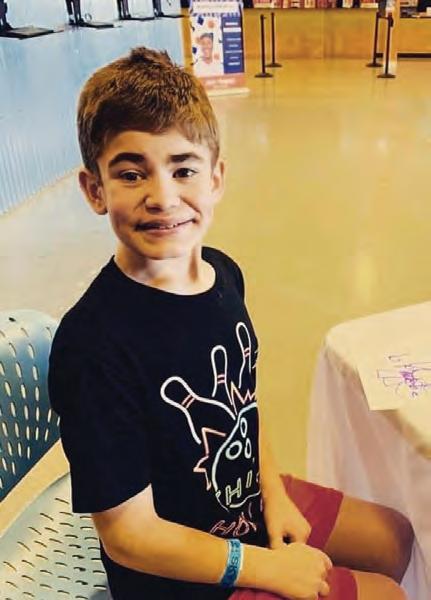
faces. While every cell in the body is affected by Sanfilippo Syndrome, b r ain cells suffer the most,” said Marisa, who is now all too familiar with medical language.
S a nfilippo’s effects on the brain become apparent between two and six years of age when speech problems, de velopmental delays, challenging behaviors, extreme hyperactivity and poor s l eep present. The cause of this rare disease is metabolic. Connor’s body cannot properly break down chains of sugar molecules. When a certain en zyme is absent or not functioning well, th e sugars are not broken down and his body stores it inside cells instead of releasing it.
M a ny children are initially diagnosed with autism before finding the under lying diagnosis of Sanfilippo Syndrome. Ch ildren with Sanfilippo go on to experience progressive dementia similar to A lz heimer’s, stealing away their skills and knowledge. Sanfilippo Syndrome will often cause these children to suffer from seizures. They will lose the ability to eat for themselves and many will get a feeding tube. They will lose the ability to walk and need a wheelchair. Relent less and devastating, children with Sa nfilippo Syndrome often pass away in their teenage years and Connor t u rned 12 this June.
“Connor is a mother’s blessing. He doesn’t have a mean bone in his bo dy. He is happy, smiley and snuggly all of the time. Connor equals love. One hundred percent pure and innocent love. I can’t imagine my life without him….No parent should ever have to go through this. I hope that our story will help spread the word and raise the money that we need to save these children,” said Marisa.
When Susan read Marisa’s post on Facebook that shared Connor’s diagno sis, she felt compelled to act. “When I first heard the news, I was heartbroken for Marisa, Connor and their family. I h a d seen her beautiful boys grow up via Facebook and I just simply couldn’t bear the thought of what they are fac ing…it came down to me looking at my o w n family and how Marisa and I both live the ‘boy mom’ life with two sons… I also recognized that I have the time to he lp. I couldn’t sit still watching a sister who I’ve always admired as a mom go through this,” said Susan.
Li ke Susan, many Alpha Phi sisters were deeply touched by what they could only imagine Marisa and her family were going through. Friends and family have generated substantial awareness and donations to kick off a fundraising campaign to search for treatments.
U n like some more well-known devastating illnesses, Sanfilippo Syndrome has no cure and its research is n o t well-funded because only one in 70,000 babies is born with this inher ited disease. Moreover, there are no cl inical trials or treatments available for children who experience Sanfilippo Syndrome Type C, which is what Connor has. The types are determined by the particular enzyme affected.
“I r eached out to Marisa via Facebook and shortly after we met up with our boys at a pumpkin patch near her home to discuss some ideas and plans f o r Connor’s Warriors,” said Susan. She reached out to every sister she was connected with, making sure they k n ew of Connor’s diagnosis and asking for ideas of ways we could supper Marisa and her family.
Th e Theta Theta women formed a private Facebook group so they could organize plans of how they could help Marissa, Connor and the family. Fellow sister Stacy Dmytryk Wolfinger (Theta Theta-St. Joseph’s) offered to help create a website that would c o ordinate the fundraising efforts. “We then needed a name,” Susan recalls, “We wanted our name to reflect strength and courage, as this battle to beat Sanfilippo is going to require a lot of both, in support of Connor and his family. Lauren DiChiacchio (Theta Theta-St. Joseph’s), Marisa’s biological sister, and other Alpha Phis have made helping Marisa and her boys their mission. "We came up with ‘Connor’s Warriors.’”
S u san and the Theta Theta sisters didn’t have to think twice about coming together for Marisa. “We are all moms, aunts or siblings ourselves and could quite easily imagine ourselves in Marisa or Keenan’s (Connor’s younger broth -
er) shoes…so we stand with them and support them in any way we can,” said Susan. They have designed logos, made t-shirts, suggested fundraising efforts , b een there to pray, support and listen .
Community support of Connor’s Warriors has been key. The Theta Theta sisters have helped raise approximately $5,000 in these first few months, and that gift has been matched several times over because Connor’s story con tinues to be shared online, through the me dia and in the community. To date, the group has raised over $175,000. The number is impressive for such a ne w effort. Connor’s family aims to raise the necessary $5 million to fund a clinical trial that could improve or extend Connor’s life or the life of another child with Sanfilippo Syndrome.
D o ctors are not sure what Connor’s future looks like. Every child facing this disease is different. His medical team is monitoring his health so they can identify any regression going forward. Marisa says they strive to make each day count. Connor’s younger brother, Kennan, has been strong and brave, the way no young child should have to be, says Marisa. If he and Connor can do what they are doing, that is all the in spiration Marisa needs to put one foot i n f ront of the other to fight for clinical trials that could help Connor.
Keenan is aware of his brother’s struggles and his parents answered his questions about Connor’s health an d prognosis. As a result of Sanfilippo Syndrome, Connor has the cognitive skills of a four or five year old, and so he does not understand much of what Sanfilippo Syndrome is. In his mind, he is just like his brother and his peers.
The love Marisa has for her children pours out of her with each breath she takes. Her road is not easy; yet, Marisa is an ever-present advocate for her chil dren. “Being a mother is, honestly, my bi ggest success. I pride myself on being very involved, present and engaged with my boys, Connor and Keenan. We have an unbreakable bond and we call ourselves the ‘little trio,’” said Marisa. “I feel incredibly fortunate to have two boys who are so loving, kind, smart, friendly, easy going and always up for fun. I cannot imagine my life any differently than the exact way it is and appreciate both of them — and their very different personalities — so much. I always talk about how lucky I am, and I truly believe it.”
S u san relates, and said, “Being a mom is about nurturing them, loving them unconditionally, advocating for them, providing for an protecting them. You pick them up when they fall. You encourage them even when they think they can’t. You are your child’s biggest cheerleader.”
Beyond the Connor’s Warriors support, the Theta Theta sisters have been raising awareness for Connor’s story on social media, making direct donations, hosting social media birthday fundraisers for the Cure Sanfilippo Foundation, hosting lemonade stands and attending live fundraising events. They have also engaged a few small business spon sors in the cause.
Fo r Susan, this experience has reminded her of one of the best parts o f A lpha Phi. “Stretches of time may pass without being able to physically see each other, but we know that when we need our sisters they will be there,” said Susan.
“For me, I needed a lot of time to pro cess Connor’s new diagnosis and feel m e ntally and emotionally ready to go public with our news. I was afraid that people would feel sorry for me, when that’s the exact opposite of what I need ed,” said Marisa. “I needed emotional su pport and a smiling face. I have been overcome with emotion by the outpour ing of love, support, guidance and ideas fr om my sisters, friends and community. It’s almost been overwhelming t h e amount of fundraising ideas that people have come to me with, but that’s a testament of how much good there still is in this world.”
The choices we make in our lives have meaning that we often don’t realize un til some time has passed. When Susan a n d Marisa made a home in Alpha Phi, they never imagined one of them would have a son whose health would one day bond them together more deeply than before.
T h at is one of the beautiful things about sisterhood. We show up. We “Stretches of time may pass without being able to physically see each other, but we know that when we need our sisters they will be there.”
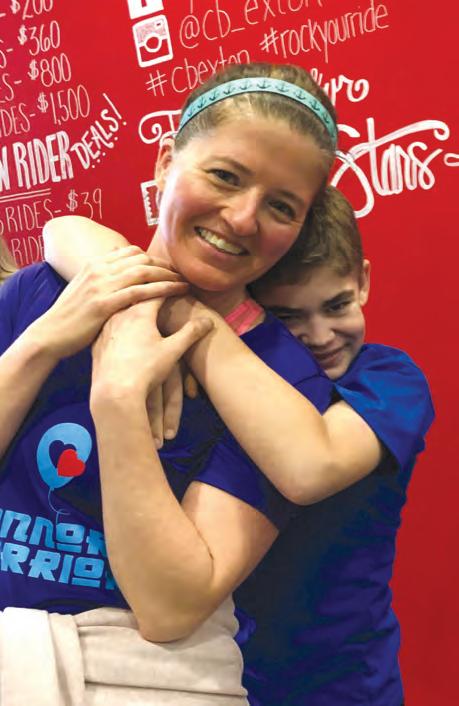
SUSAN PAGE DAILY (THETA THETA-ST. JOSEPH’S)
care. We don’t know how it all plays out, but we are there for one another. Life’s moments — especially the hard ones — are a little lighter when we have others to help us carry them. Alpha Phi is not an experience that only lives on college campuses. It is not a series of meetings. It can’t be reduced to a collection of photographs or videos. It is a sisterhood built on the shoulders of women — from 1872 through today — with arms linked, holding one another up and reminding each other we are in this together.
For those sisters who want to learn more about Connor’s journey, please visit connorswarriors.com and fightforconnor.com.
SHINING A LIGHT : ALPHA PHIS STEP UP by Gina Henke

When the COVID-19 pandemic changed the landscape for all of us with regard to health and well-being, education, social gatherings, recreation and work, it did not change Alpha Phi’s commitment to one another and our high ideals.
For Alpha Phis, the Big Dipper is an important icon. Part of the constellation Ursa Major, the stars in the bowl of the big Dipper point to the North Star — a star that always appears in the same place in the sky, acting as a positional beacon and giving us a sense of direction. Despite how the world is changing, Alpha Phis are standing strong for themselves and for others. There are many members who are performing essential work — so many more than we have pages in this magazine to feature — and we thank each of them for giving generously of themselves. We are proud to be your sister.


SARAH HARTENSTEIN PATTERSON

As the curator of birds and mammals at the St. Augustine Alligator Farm Zoological Park, Sarah
Hartenstein Patterson (Iota
Delta-Rhode Island) is responsible for those animals and the staff caring for them. Since the pandemic has impacted every aspect of life, the animal population is feeling the effects as well. Her department consists of 56 different species of birds and mammals, many of which are conservationally significant. In light of the changes brought about by the pandemic, Sarah and her team work to ensure their animals still receive excellent care. They are split into separate shifts so that if someone gets sick there are still teammates able to care for the animals. “Without guests in the zoo, social animals and animals that would have participated in encouters have been looking to their caretakers to provide them with additional attention,” said Sarah. Innovation and character are the ideals Sarah most draws on right now. “Because so many of the species that we work with are conservationally significant, it is imperative that we continue to provide exceptional care for these individuals today, to continue our work to see these populations through to the future,” said Sarah. “As a manager, you always strive to set high expectations and to set an example for others to follow. This becomes increasingly complicated when only half the staff is working at a time, and you have not been able to see the other half of the team for several weeks. As a team, we make things work because the lives of the animals under our care depend on us doing so. We come up with creative ways to continue to go beyond the basics, because the quality of care that we provide is their quality of welfare, and they deserve the best. While the expectation of excellence in care will never change, it will be nice to return to a normal when we can all be together face-to-face to work to achieve it.”
Brooke Thadeus
BROOKE THADEUS (ETA LAMBDA-GEORGE MASON) has volunteered for Annandale Christian Community for Action for the last 10 years and is also a patient access associate for Inova Medical Group. As a volunteer, she stocks shelves and delivers groceries to those in her community in need of food. Especially now, when many are losing income and the ability to comfortably provide for their families, having the ability to provide access to food is something Brooke is proud to do. At her job, Brooke triages calls for an outpatient primary care office so that patients are able to reach the appropriate provider. Now more than ever, she has been able to help those who may be fearful about their situation and provide comfort by sharing resources they need. She helps simply because she is able to and by helping those most vulnerable, she improves their well-being. It gives them the opportunity to help others in-turn. “The high ideal of membership I can most relate to right now is Innovation because there will always be people who need assistance, and I always want to find a way to help them no matter what situation. At this time, I have found that in some ways I may have to change how I work or interact with others, but the goal remains the same, which is to ultimately help those in need anyway I can,” said Brooke.
Alexis Abbott
ALEXIS ABBOTT (THETA LAMBDA-CENTRAL MISSOURI) has volunteered her time to make masks to donate to local hospitals in need of cloth face coverings.
SHINING A LIGHT KYNDAL IRWIN,
BSN, RN

KYNDAL IRWIN (GAMMA
IOTA-TEXAS TECH) is an Alpha Phi House Corporation board member and a registered nurse at Lubbock Plastic Surgery Institute and took a leave of absence to assist COVID-19 relief efforts in New York City. Like many volunteering their medical services, Kyndal spent 21 days away from her family and friends working in New York. The unit she was placed into is one that treats patients with dementia and traumatic brain injuries. The majority of these patients have been there for multiple years. The patients were Kyndal’s number one priority. Since their families could not visit them, it was important to be there to support them. The nurses exuded innovation and generosity in their patient care, Kyndal said, finding new ways to care for patients and putting themselves in the line of the virus to protect others. “The character of all of these nurses is just remarkable. Every nurse here is wanting to make a difference and is here to better the NY community and to be here for the patients. We all just want the patients to be taken care of and cared for how we would want our family members to be cared for. We also want the staff at all of these hospitals to be able to have a breather from the stress of their jobs since they have been putting in countless hours since this pandemic began.” DESTINEE BAUCUM DESTINEE BAUCUM (GAMMA XI-WICHITA STATE) is a chapter advisor at Wichita State and traveled from Kansas to New York to assist during the pandemic. Pictured here, center in scrubs and jacket, with her local medical colleagues before leaving to provide weeks of nursing support and care to patients in hard-hit New York, she volunteered to go because she felt, “a calling to help the people of NYC and bear witness to this pandemic with [her] own eyes.” She also wanted to show the women she advises that it is important to follow their hearts and dreams. Before she made the trek to New York, the support of the Panhellenic community made Destinee’s journey preparations easier. Sally Seguro, a Gamma Xi alumna, put Destinee in touch with fellow Gamma Xi Kathy Webb, who helped her take the necessary legal steps to ensure Destinee had a living will and power of attorney documents ready in case Destinee became ill while caring for patients in New York. Without asking for anything in return, these alumnae wanted to help. They provided services to help with Destinee’s journey to help in New York, which Destinee says this brought much happiness to her heart and reminded her that sisterhood is for life! “So far this experience has made me appreciate my loved ones more. Seeing how fast this virus can take a hold of someone has truly humbled me,” said Destinee.
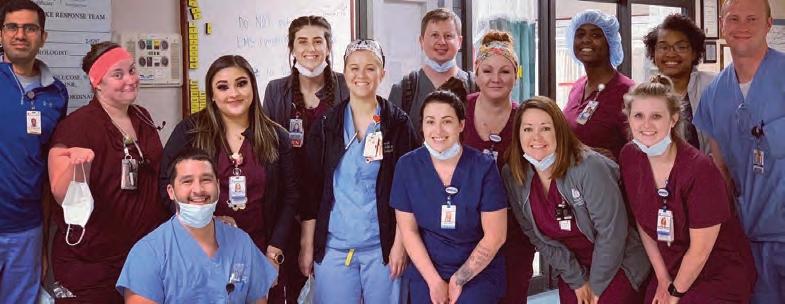
Mackenzie Corbin, RN
MACKENZIE CORBIN (GAMMA ETA-NORTH TEXAS) is a nurse at Medical City Heart and Spine Emergency Department and has been caring for patients for 12 years. She says this virus outbreak has been stressful, more so than the Ebola scare. Mackenzie’s world at work has changed and so has her world outside work. She has acted as a resource, sharing factual information with family and friends as she tries to calm their fears. She has sewed fabric mask covering for members of her church and her family. Mackenzie has offered to give COVID-19 presentations at her daughter’s daycare before they were closed through shelter in place orders. She has struggled like all healthcare workers, terrified that she may get sick or take the virus home to her husband or toddler. She wants to huddle close with her family, she wants to care for her patients, she wonders if she is doing the most appropriate procedures amidst the ever-changing protocols. The mental load is heavy; yet, the silver linings are there. The support she and her colleagues are giving each other right now is bonding them closer together. Mackenzie’s mother and sister have stepped up to help care for her daughter so she and her husband can work, which gives her daughter special time with her relatives she would not otherwise have. Generosity is the Alpha Phi

ideal she most relates to right now, and she is giving it with grace. One of her patients came into the ER with congestive heart failure and tested positive for COVID-19. The patient was alone, as no visitors were allowed inside the hospital in order to slow the spread of the virus. As the patient cried and asked about the future, Mackenzie did the thing she knew was right. She took the patient’s hand and said she would do everything she could do to pull the patient through.
ERIN LANGLEY
ERIN LANGLEY (BETA ZETA
IDAHO) is a graduating senior studying exercise, sport and health science, and she works at Gritman Medical Center. The facility, like many other hospitals, has set up outdoor tents to test and help triage patients who present with any respiratory problems or exposure concerns related to the virus. Erin has been volunteering to work in these tents to register patients as a way of supporting other hospital staff and their families, patients and her community by reducing risk of unnecessary exposure. Even during these times, it’s important that people still have safe access to regular, necessary healthcare, and the tent system allows for that. “With the events happening in the world and in my community, I am identifying most with our ideals of innovation and character. It’s been amazing to witness the ways our hospital and clinics are constantly improving methods and taking new measures to be able to continue to serve the community in a safe and effective manner. It’s been inspiring to see my coworkers step up and fill positions, even if it puts themselves at risk, which shows their true character. I’ve noticed my local community stepping up to show support to health care workers and each other, and I’m so proud to be part of it.”
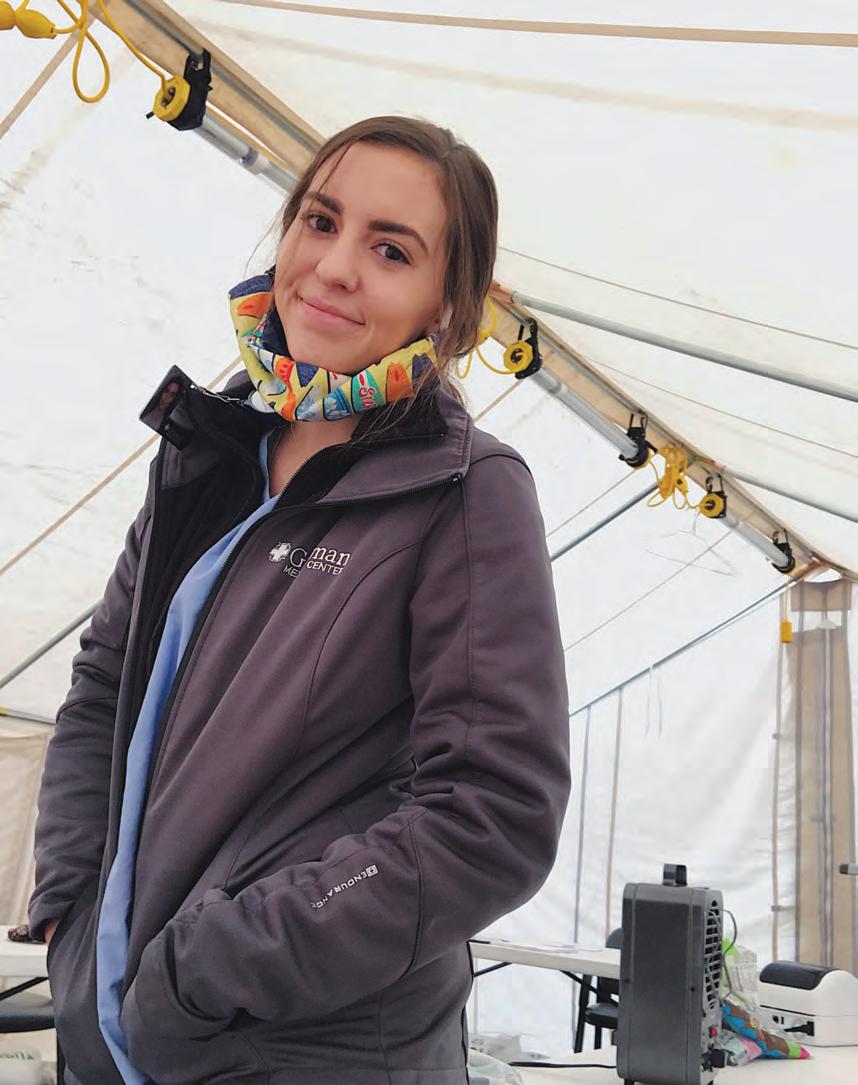
The Forget-Me-Not Fund Today
AT THE TIME OF PRINT, 45 Alpha Phi sisters, including 35 collegians and 11 alumnae, have received Forget Me Not grants to support them in the wake of COVID-19. Alpha Phi Foundation is committed to supporting members during times of hardship and continues to receive requests for Forget Me Not grant aid. During this pandemic, many sisters are experiencing loss of income and housing, losing the ability to meet their most basic needs. For some, recent challenges are coming on top of an already difficult situation, like a medical crisis or death in the family. The Forget Me Not Fund will continue to support sisters as we navigate this uncertain time together.
Read about the origins of the of the Forget Me No Fund on page 14. For more information about the Fund, please contact Alpha Phi Foundation at programs@alphaphifoundation.org. “I am very grateful to be a part of Alpha Phi and I continue to learn more and more about what this sisterhood truly is. I never thought I would be applying for emergency funds and that my sorority’s international foundation would be the one to carry me through this difficult time. I really look up to all of the passionate and successful women in Alpha Phi, and I know that this is not just a sorority I’m in for four years of my college life, but a sisterhood and strong organization that I am a part of for life.”
— AN ALPHA PHI SISTER
JULIANNA WASHINGTON
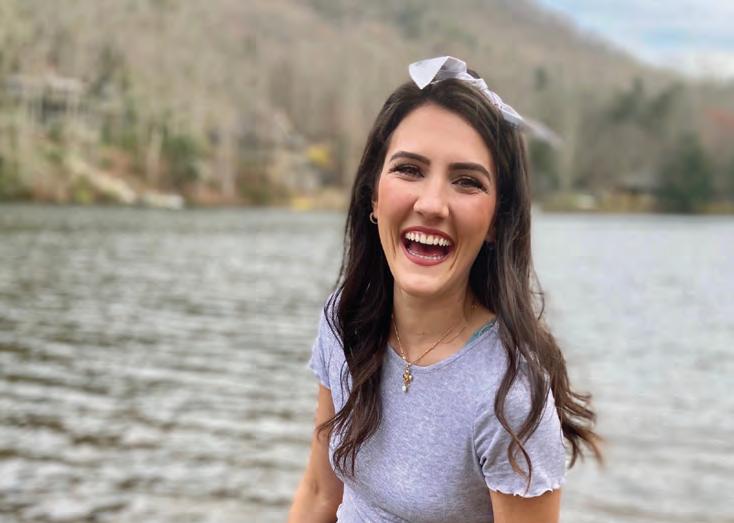
JULIANNA WASHINGTON (OMEGA-TEXAS) teaches 6th grade math at Kennedy Curry Middle School in Dallas as part of Teach For America. She is working in a school that is ranked 2,045 out of 2,122 middle schools in Texas, and many of their testing scores are nearly 25 percent below the average. Frequently, her students do not have access to technology or the internet. Some do not even have regular access to running water, and nearly 90 percent rely on some sort of school-provided meals. All of this makes physically-distanced learning more challenging than ever. That said, Julianna has been hard at work all year helping her students grow and improve. On a mid-year assessment, her students surpassed the school passing average grade by over 20 percent. She is committed to their continued success and so Julianna spent the first three weeks after their spring break calling nearly 80 of her students and their families in an effort to help them gain access to computers and internet hotspots from the school. She also let them know when the school would be providing meals for students to have at home. Making use of virtual learning resources, she is putting in extra hours and she knows her students are sometimes being tasked with extra responsibilities during this time, especially as parents’ work requirements change. She is passionate about encouraging them, keeping them connected and trying new ways to help close the learning gap. “I can most closely relate to our ideal of innovation right now because we have had to switch entirely to online learning. We have had to create an entire classroom experience through Google Classroom and make it quality education. We have had to adjust and find a way to be accessible to teach and help students in an effective way, all through a cell phone or computer screen.”
Luanne Thomas Ewald
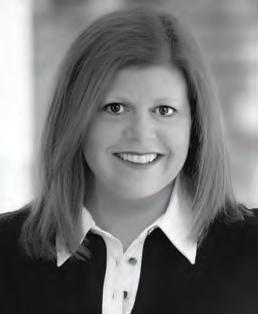
LUANNE THOMAS EWALD (ETA MUMARQUETTE) is the Chief Operating Officer at the University of Michigan C.S. Mott Children’s Hospital and Von Voigtlander Women’s Hospital. In addition to managing operations at both facilities and working to keep staff, patients and families well, she was asked to serve on the leadership team to open a Field Hospital in Ann Arbor. The field hospital would have been set up at the University of Michigan Performance Center indoor track, but Luanne and the team were grateful the “Stay Home. Stay Safe.” initiatives helped flatten the curve of cases and made opening unnecessary at this time. The plans for the field hospital will serve well for any future surges or disease outbreaks.
The team consisted of military trained physicians and nurses from Michigan Medicine. Southeast Michigan has been hit hard with COVID-19 patients and so overflow hospital areas were developed to meet the demand. “It is also privilege and a calling,” said Luanne. “I am thankful to be able to work to help children, women and families on a daily basis, and it was a privilege to be asked to work on a Field Hospital to help the citizens throughout the State of Michigan. I am proud to be a part of this team who consistently puts our patients and families at the forefront. Always.” She is embracing all of Alpha Phi’s ideals during this time. Luanne has witnessed the generous spirit of front-line workers and has seen doctors, nurses, administrators and security teams show the depth of their character through their selfless action. She and her colleagues have been part of wonderful developments and innovations that came about because of the pandemic, and now some of these will be part of the normal operations going forward. “Throughout the pandemic, I have remained in constant contact with my Alpha Phi sisters through text messaging and Zoom virtual get-togethers. I’ve also watched my daughter communicate with her Alpha Phi sisters via Zoom and other social media outlets. Our bonds are always important, but in times of uncertainty, we need to be supporting each other and communicating with each other more and more.”








